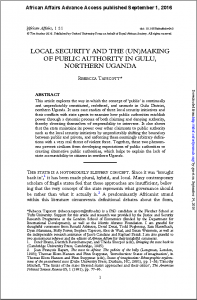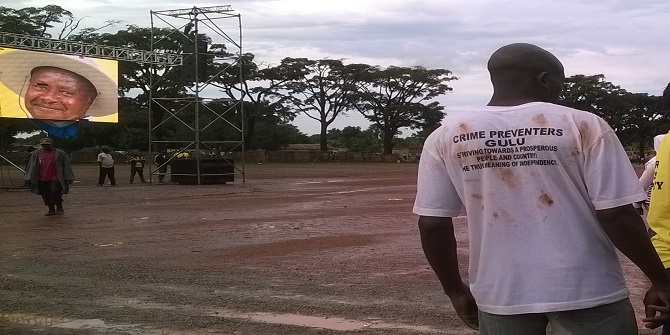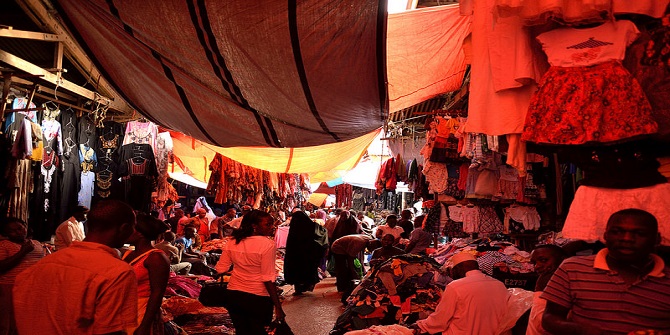Theory on state formation and subnational governance generally focuses on ordering—how rulers organize people and space to maximize control and extraction. Indeed, a new literature on “public authority” has recently contributed to the ways in which such order is produced. These theories rest on the assumption that the world is divided into “public” spaces, where the state directly extracts resources and enforces rules and bargains; and “private” spaces, out of reach of the state’s long arms. It is this stable and socially accepted division between “public” and “private” that allows for predictable terms of exchange, based on which citizens can maximize their returns under given constraints (for example, using forum shopping in response to limited institutional penetration or relevance of the state) and make claims on the state (for example, for the provision of services in exchange for taxation).
A new article by Rebecca Tapscott presents rich empirical data from Gulu, northern Uganda that questions this presumption of a stable and accepted divide between public and private spheres. Instead, Tapscott’s article starts from the supposition that public and private are fluid concepts that are constantly open to redefinition, allowing those with superior access to violence and resources to determine a place, person, or event to be “public” or “private” as it suits them. The paper uses case studies of three local security initiatives (groups akin to vigilante or community watch groups) and their conflicts with state agents to show how public authorities dynamically claim and deny authority, thereby claiming the benefits of rule while divesting themselves of responsibility to intervene. The article also shows that the state maintains its power over other claimants to public authority (such as vigilante groups) by unpredictably shifting the boundary between public and private, and enforcing these seemingly arbitrary definitions with a very real threat of violent force. Together, these two phenomena prevent civilians from developing expectations of public authorities or creating alternative public authorities. This helps to explain the absence of a meaningful state-society contract in northern Uganda. It also helps explain the persistence of fragile yet resilient government institutions that, though they provide few services, have eliminated meaningful competition and established themselves as the most viable, or least-worst, governance option.
presents rich empirical data from Gulu, northern Uganda that questions this presumption of a stable and accepted divide between public and private spheres. Instead, Tapscott’s article starts from the supposition that public and private are fluid concepts that are constantly open to redefinition, allowing those with superior access to violence and resources to determine a place, person, or event to be “public” or “private” as it suits them. The paper uses case studies of three local security initiatives (groups akin to vigilante or community watch groups) and their conflicts with state agents to show how public authorities dynamically claim and deny authority, thereby claiming the benefits of rule while divesting themselves of responsibility to intervene. The article also shows that the state maintains its power over other claimants to public authority (such as vigilante groups) by unpredictably shifting the boundary between public and private, and enforcing these seemingly arbitrary definitions with a very real threat of violent force. Together, these two phenomena prevent civilians from developing expectations of public authorities or creating alternative public authorities. This helps to explain the absence of a meaningful state-society contract in northern Uganda. It also helps explain the persistence of fragile yet resilient government institutions that, though they provide few services, have eliminated meaningful competition and established themselves as the most viable, or least-worst, governance option.
Tapscott’s argument contributes to, and further develops, theory about whether governance works on its own terms, such as Chabal and Daloz’s Africa Works. Chabal and Daloz describe an order that is illegible to the outsider, but that insiders can negotiate, albeit with care. Rules of the game exist, though they may be unintelligible to outsiders. Instead, Tapscott shows that fragmentation, state capacity for overwhelming violence, and the constant possibility of (state) intervention mean that rules can be implemented, ignored, or changed at any time. Indeed, the rules are not illegible so much as transient, fleeting, and manipulable. The paper calls on academics and practitioners to take disorder seriously—to understand it as a key component of governance, rather than a byproduct of poverty, ineptitude or corruption. At a policy level, this paper identifies a jurisdictional uncertainty as a very specific type of disorder essential to this governance strategy—here, in the form of competing and fragmented security and justice actors—that leaves citizens unable to make meaningful claims on the state or to rally behind an alternative option. Read the paper here.
Note: This article gives the views of the author, and not the position of the Justice and Security Research Programme, nor of the London School of Economics.





